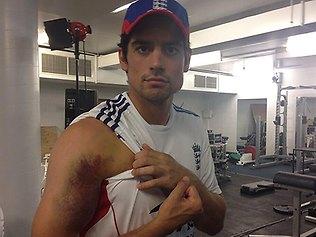England's Ashes tourists take it on the chin
IT wouldn't be a true Ashes series without a bit of Pom-bashing, but England's cricketers may decide the best way to deal with it is to say nothing.

NOBODY should be surprised that a former Australian player - Shane Warne in this instance - is criticising an England captain for lacking imagination or that the squad's exhaustive dietary requirements were leaked to a Sydney newspaper.
Australians have long believed their duty is to disparage the Poms. Initially, the abuse came from the barrackers in the “Outer” who took umbrage at what they deemed the haughty manner of a Douglas Jardine or a Mike Brearley, or the intimidating bowling of John Snow, whose manhandling by a spectator persuaded Ray Illingworth to take his team from the field.
Public address announcers can be among the worst offenders. Michael Atherton's creaking fielding unit once warmed up to the Muppet Show theme tune, David Gower walked out to bat to Those Magnificent Men in Their Flying Machines and Paul Collingwood was greeted ironically as Paul Collingwood MBE on the disastrous 2006-7 tour, for which the local advertising campaign invited Australians to “Tonk a Pom”.
With the rise of sledging, the players embraced this hostility. In the lead-up to the 1974-5 series, Dennis Lillee published a book in which he said he aimed to hit batsmen. The Australian board had just lifted a ban on players debating on-field matters provided they did not bring the game into disrepute. No action was taken. England's feeble performances in a series lost 4-1 further legitimised the process.
Whenever the Australians slipped into overfriendliness - as happened in 1985 and 2005 - they quickly and brutally mended their ways.
Allan Border's reaction in 1989 set the tone for 15 years. He used Merv Hughes as his enforcer, who, in the words of Steve Waugh, Border's greatest disciple, became a snarling fire-breather who welcomed new batsmen “with a bumper and a gobful of choice phrases”.
Waugh wrote: “Ashes cricket in the 1990s was a psychological battle that curtailed many English careers. They were quality players but didn't have sufficient bond as a team to instil any fear in us. Under the blowtorch they seemed to buckle ... their respect for us bordered on them being resigned to defeat.”
Atherton noted in 2001 how extracts from Australia team talks “would mysteriously appear under a journalist's door”.
The Australian press was co-opted to lap up Warne's talk of new mystery deliveries, Glenn McGrath's predictions of 5-0 whitewashes and John Buchanan's jibes that Kevin Pietersen was a man apart from his team.
The freeze is on again now. In England last summer Michael Clarke was just too reasonable for an Australian captain taking a hiding. Even before Warne's intervention last week, Darren Lehmann, the coach, changed the tone with his criticisms of England's dour play and his call for Australians to make sure Stuart Broad returned home in tears.
When Alastair Cook's team arrived last month one Australian newspaper greeted England's “Urinators” - a reference to their late-night celebrations at The Oval - while a Melbourne firm printed T-shirts bearing the words “Never forgive”, in reference to Broad not walking at Trent Bridge.
As always, the question for the England team is how to react to the provocation. On his first tour of Australia, Jardine was told by a teammate: “They don't seem to like you very much over here.” He replied: “It's f***ing mutual.” And the die was cast for Bodyline four years later.
Brearley found that by ignoring the Australian players when they had a go at him, his silence confirmed him with the public as “the stuck-up Pom they knew I was” on the 1978-9 tour. He regretted being unable to engage with them in the way Tony Greig or Derek Randall had.
After giving the matter much thought, England believe the Greig-Randall approach is the way to go - essentially to keep calm and carry on. Asked to respond to Warne's verdict on his tactical abilities, Cook skilfully drew its sting by conceding that, yes, perhaps he could be more imaginative. Cook has yet to react to Warne's subsequent suggestion that Pietersen is the best man to lead this England team.
Whether this approach can be sustained remains to be seen. There are signs that the fuse of the team director, Andy Flower, may be shortening. In England he could not resist a swipe at Clarke by saying there was more to captaincy than “funky field settings”.
Best say nothing, especially considering that when Border turned around Australia's fortunes, funky field settings were as much a part of the transformation as the harder-nosed approach.
The Sunday Times


